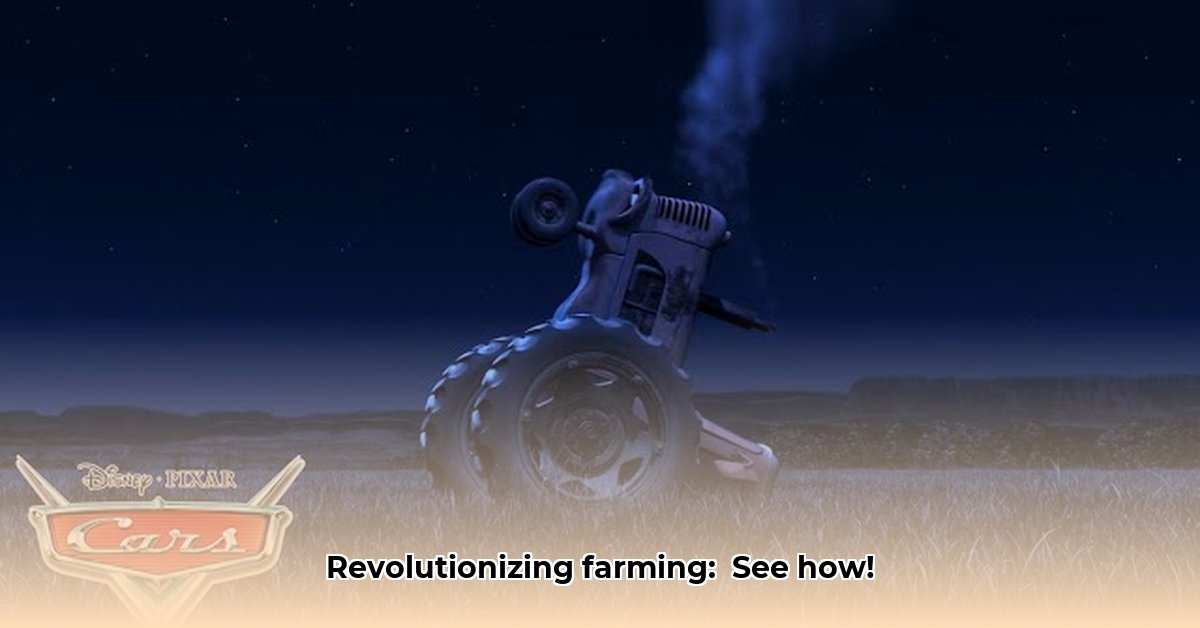
That Hilarious Tractor Tip-Over: It's More Than Just a Joke
Remember the scene in Cars where Mater and Lightning McQueen hilariously topple those giant tractors? While undeniably funny, this seemingly frivolous moment offers a surprisingly insightful commentary on the fragility of our current agricultural practices. The ease with which those massive machines are overturned subtly highlights the inherent risks within our large-scale, often unsustainable farming methods. Just as the tractors in the movie are vulnerable to a clever tipping maneuver, so too are our current methods susceptible to unforeseen environmental and economic consequences. For smaller-scale, more sustainable options, consider DIY chicken tractor plans.
The Giant Farm Conundrum: Efficiency Versus the Environment
Large-scale farming has undeniably provided an abundance of food; however, this efficiency often comes at a significant environmental cost. Monoculture farming (planting vast fields with a single crop) depletes soil nutrients, reducing long-term fertility. This is akin to perpetually withdrawing from a bank account without making deposits – eventually, insolvency is inevitable. Furthermore, the extensive use of pesticides and chemical fertilizers, while boosting short-term yields, disrupts the delicate balance of ecosystems, harming beneficial insects like bees, birds, and soil microbes. Are we willing to sacrifice long-term ecological health for short-term gains?
Rethinking Farming: A More Sustainable Path Forward
Fortunately, we don't have to continue down this potentially disastrous path. Sustainable agriculture offers a more balanced approach, prioritizing both food production and the long-term health of the planet. This involves creating farming practices that exhibit resilience and can withstand environmental and economic shocks. It demands a holistic overhaul, not simply incremental adjustments.
Small Steps, Big Impact: What You Can Do to Help
Even seemingly small individual actions can collectively create a significant positive impact.
Shop Local, Eat Local: Support local farmers' markets and choose produce that hasn't traveled vast distances, reducing your carbon footprint and boosting your community. (See LocalHarvest for a directory of farmers' markets near you).
Waste Less, Compost More: A substantial amount of food is wasted each year. Strategic meal planning and composting food scraps significantly reduce waste and environmental impact.
Speak Up: Advocate for policies supporting sustainable agriculture by contacting your local representatives. Your voice can promote crucial changes at a policy level.
Educate Yourself: Learn about sustainable farming practices to make informed consumer choices. Abundant resources are available online and in libraries.
Technology to the Rescue: Precision Farming and Beyond
Technology offers solutions beyond merely creating faster, larger machines. Precision agriculture, utilizing GPS-guided tractors and other smart technologies, optimizes resource use. These tools allow farmers to apply precise amounts of fuel, water, and fertilizer, minimizing waste and environmental impact. Smart irrigation systems, for example, prevent water overuse while ensuring crops receive precisely what they need, leading to improved water use efficiency by up to 50% (Source: FAO).
Finding Stability: The Path to a Resilient Food System
The playful scene in Cars serves as a potent reminder: our current agricultural practices are fragile. We must build a more robust, adaptable system. Sustainable agriculture isn't a fleeting trend, it's a necessity for the long-term health of our planet and the stability of our food supply. By uniting farmers, policymakers, consumers, and technology developers, we can create a future where our food systems are as resilient as the land they depend on. The transition requires collective will and commitment, but the rewards—a secure, sustainable food future—are well worth the effort.
Key Takeaways:
- Our current agricultural practices are vulnerable to environmental and economic shocks.
- Sustainable farming methods prioritize both food production and long-term environmental health.
- Individual actions and technological advancements play crucial roles in creating a more sustainable food system.
- Policy changes are essential to support the widespread adoption of sustainable farming practices.
- A resilient food system requires a collaborative effort from all stakeholders.